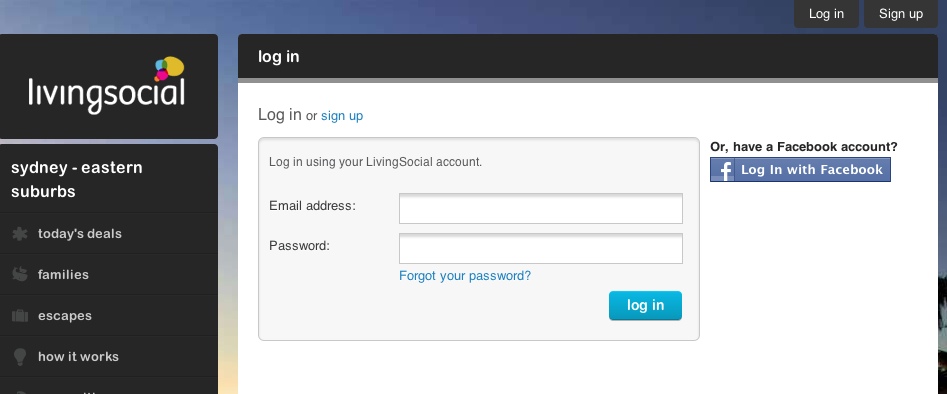When you visit a website that requires you to login, do you sometimes use the option to login with your Facebook or Twitter social media login?
Do you, and your friends and other online users, realise that when you choose to use your social media login to login to a non-social media website that they are able to collect a lot of the information that is contained within your social media profile? Things like your marital status, your date of birth and your personal interests – stuff that you may not have chosen to give to that non-social media website had they had a form with these fields for you to fill in. This is your private information and your privacy that should be considered.

Daily Coupon Deal sites are a good example of non-social websites that use a social media login option to capture more information about your personal interests
Within the digital marketing and online advertising industry the use of social media logins to non-social media websites is a point of debate. Technically your privacy is protected and the website must offer you a standard login option but not much is done to explain to users, at the point of login, how the functionality works. I don’t think many people using these social logins understand what is happening, they use it simply to avoid having to remember one more online password.
I’ve certainly noticed that when I try to login to the Living Social Daily Coupon website through the standard login – it often does not work and it prompts me to use my social media login. Why? Because my Facebook or other social media profile is constantly being updated – with new LIKEs, with new relationship or work information. Every time I login with my social media login to a non-social media website they are able to scrape new information that I may have added to my profile. In your social media website’s privacy policy this information will be available. The privacy policy or terms and conditions of the non-social media website that you’re logging into will also stipulate this information as well, but because most consumers don’t realise what’s happening, this is a grey area. Do you feel that this is an invasion of your privacy?
I’m ok with this, because I see it as a way to receive more targeted, more relevant communications and offers – especially from these daily deals websites but there are some types of websites that I don’t want to have this behavioural information.
I noticed that the Sydney Morning Herald (smh.com.au) also uses this. My SMH login allows me to manage my email subscriptions and interests but Fairfax are not tailoring my internet session with news stories that are matched to my interests – despite having all this extra information about me. And even if news websites like the Smh.com.au did tailor the content to my interests, would I be missing out on other relevant news stories, things I would be more interested in, because my social media profile might represent my loyalties to friends pages and businesses that I’ve LIKEd to help them grow their numbers, rather than because I’m interested in their product or services.
I’m a big advocate of behavioural targeting and providing online users with more targeted and relevant communications, but the data captured about customers does not always truly represent their preferences.
So, my question to you is, did you know that when you were logging in to a non-social media website with your Facebook or Twitter social media login that they were able to capture your social profile information?
If the answer is no, now that you know, does it bother you?

I knew they would get my personal information, but it is too annoying to have to create a new username and password every time.